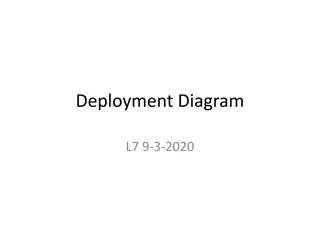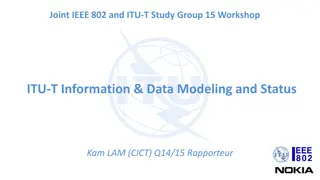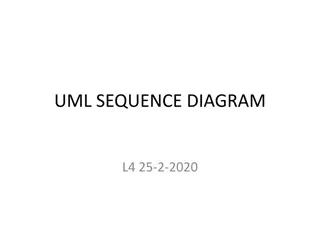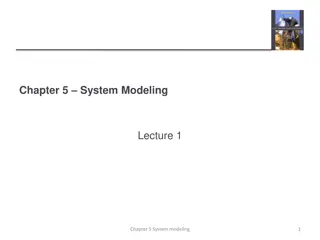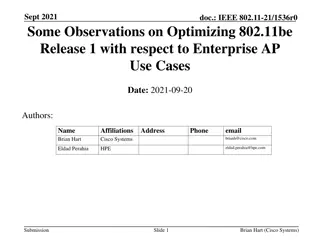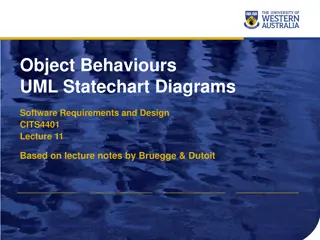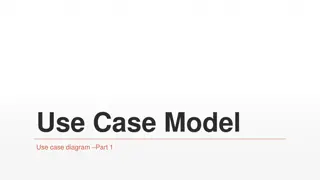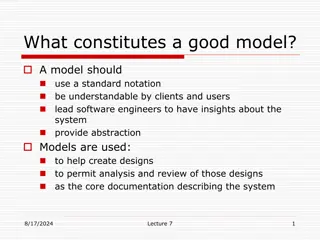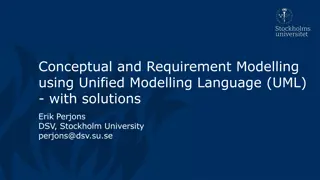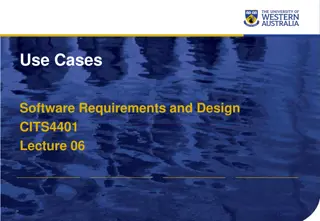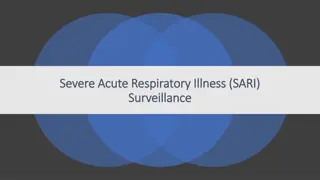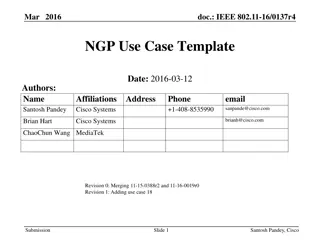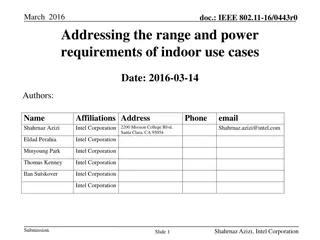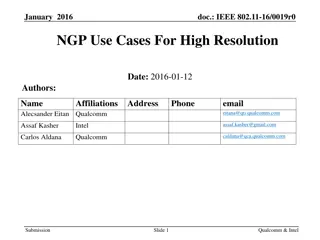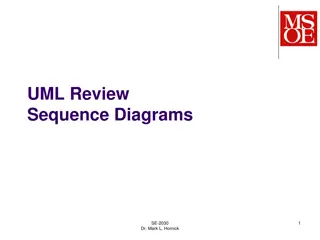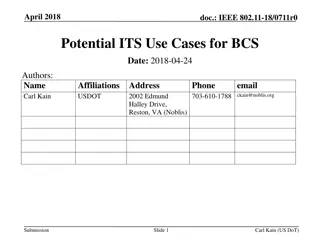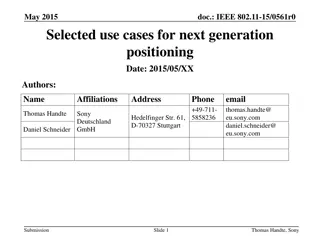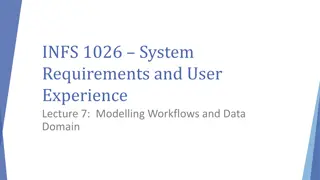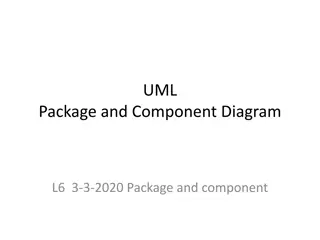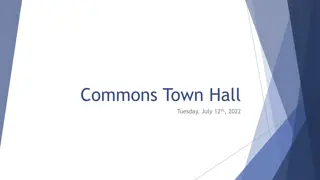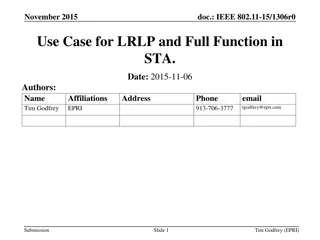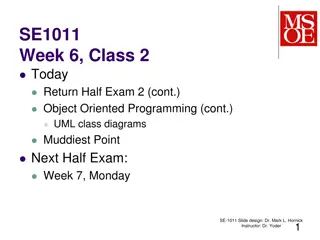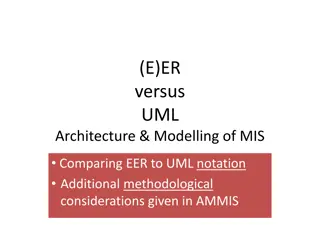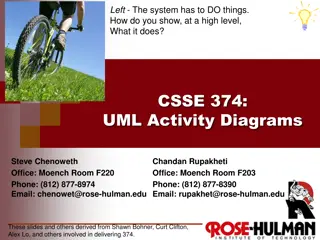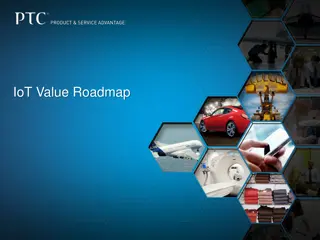Understanding Software Analysis and Design Process
Software analysis and design involve a systematic approach to understanding user requirements, creating logical models, and transitioning to detailed design specifications. Requirements analysis focuses on capturing system requirements, while design translates these requirements into implementation
7 views • 16 slides
Understanding UML Deployment Diagrams
UML Deployment Diagrams show the execution architecture of software systems, illustrating how software deployment targets are assigned artifacts to nodes. Nodes represent hardware devices or software environments connected through communication paths, while artifacts are concrete elements deployed o
1 views • 22 slides
Presentation on Police Misconduct Cases by Independent Police Investigative Directorate (IPID) - Strategic Plan 2012/17 Joint Meeting
IPID, as an oversight body, investigates cases involving the police as mandated by the IPID Act. This presentation covers the legislative mandate, total case intake, COVID-19 related cases, gender-based violence cases, and comparisons of cases received. It also highlights cases related to police act
0 views • 23 slides
Enforcement Division Quarterly Progress Report September 2023
The Enforcement Chief has been tasked with reducing open cases by 75%, ensuring annual carryover cases do not exceed 625, and resolving cases within two years. Progress on the directives is shown through case closure data comparison and specific targets set for reducing pre-2023 and carryover cases.
0 views • 7 slides
Understanding Software Testing: Test Cases, Selection, and Execution
Software testing plays a crucial role in identifying and resolving issues within software products. Test cases, selection, and execution are fundamental aspects of the testing process. Test cases define conditions for testing software functionality, with a focus on repeatability and data specificity
2 views • 36 slides
Evolution of Modeling Methodologies in Telecommunication Standards
Workshop on joint efforts between IEEE 802 and ITU-T Study Group 15 focused on information modeling, data modeling, and system control in the realm of transport systems and equipment. The mandate covers technology architecture, function management, and modeling methodologies like UML to YANG generat
1 views • 16 slides
Understanding UML Sequence Diagrams and Their Applications
UML sequence diagrams depict how objects interact in a given scenario, showcasing messages sent between targets on lifelines. They are valuable for detailing use cases, modeling logic, task flow between components, and understanding process functionality. Objects, boundaries, controls, and stereotyp
1 views • 30 slides
Understanding System Modeling in Engineering
System modeling in engineering involves developing abstract models to represent a system from various perspectives using graphical notations like UML. These models aid in understanding system functionality, communicating with stakeholders, and documenting requirements for new systems. Existing and p
2 views • 53 slides
Trial of Summons Cases by Magistrates - Overview and Procedures
Trial of summons cases by magistrates involves the process of handling offenses that are not warrant cases and do not carry severe punishments. The accused is informed of the charges, given the opportunity to plead guilty or provide a defense. The procedures for summon cases ensure that the accused
0 views • 20 slides
Observing Optimization of IEEE 802.11be Release 1 for Enterprise AP Use Cases
IEEE 802.11be is being optimized for enterprise use cases due to existing features that can be enhanced. The focus is on educating about enterprise Wi-Fi operations and increasing awareness within the wider community. Various enterprise use cases such as call centers, events, hospitals, and office d
0 views • 13 slides
Understanding Object Behaviors and Statechart Diagrams in Software Design
Object behaviors and UML statechart diagrams play a crucial role in software requirements and design. State machines, transitions, events, and states are essential concepts in modeling object behavior in response to external events. By utilizing UML statechart diagrams, one can effectively represent
0 views • 23 slides
Understanding Use Case Modeling in System Development
Use case modeling is a critical aspect of system development, capturing system behavior and interactions. It involves representing how a business system interacts with its environment through formal scenarios. Use cases benefit communication, identification, and verification, providing a clear under
0 views • 34 slides
Municipalities Legal Cases Overview
The content discusses various legal cases relating to municipalities, focusing on referrals and investigations by the Special Investigating Unit (SIU) and the National Prosecuting Authority (NPA). It includes breakdowns of SIU referrals, highlights of specific cases in Tshwane and Ekurhuleni Metropo
5 views • 29 slides
ONAP Dublin Release: PNF Pre-Onboarding and Onboarding Use Cases
This document provides insights into the PNF pre-onboarding and onboarding use cases in the ONAP Dublin Release. It covers topics such as PNF definition at design time, instantiation in ONAP at run time, and the processes involved in onboarding a PNF vendor archive. The use cases highlight the align
1 views • 8 slides
Understanding UML for Effective Software Design
A good model should utilize standard notation, be easily understandable, and provide insights for software engineers. UML features, essentials of UML class diagrams, and details on classes, associations, and multiplicity are covered. The objective is to assist in software development through abstrac
3 views • 48 slides
Understanding Conceptual and Requirement Modelling Using UML
Enterprise and system models play a crucial role in the business world. This collection of images showcases various aspects of conceptual and requirement modelling using Unified Modelling Language (UML). From business process models to human interactions with software systems, these visual represent
1 views • 92 slides
Understanding UML Use Cases for Software Requirements and Design
Use cases play a crucial role in defining software requirements and design. They outline interactions between actors and the system, describing functional requirements from the user's perspective. Identifying actors, their interactions, and goals are essential when writing a use case. This process h
0 views • 24 slides
Surveillance and Monitoring of Severe Acute Respiratory Illness (SARI) for COVID-19
Introduction to the surveillance of Severe Acute Respiratory Illness (SARI) with a focus on COVID-19 cases and clusters. The monitoring of hospitalized SARI cases, identification of unlinked cases, and implementation of control measures to reduce transmission are highlighted. Criteria for defining S
2 views • 11 slides
Proposed Use Cases Template for Next Generation Positioning
This document presents a proposed template for describing use cases and location requirements for Next Generation Positioning technology. It includes detailed information on user tasks, environment specifications, key location requirements, expected accuracy, latency, refresh rate, and simultaneous
2 views • 35 slides
IEEE 802.11-16/0443r0: Addressing Indoor Use Cases' Range and Power Requirements
This presentation by Shahrnaz Azizi from Intel Corporation discusses the range and power requirements of indoor use cases, focusing on the Smart Home as the most promising for successful 802.11 penetration into the IoT market. The presentation explores the need for low power and range in devices wit
2 views • 9 slides
IEEE 802.11-16/0019r0: Use Cases for High Resolution Location Estimation
This document, dated January 2016, outlines various use cases for high resolution location estimation within different environments such as stores, wearable devices with augmented reality features, and conference rooms. The use cases include scenarios like tracking user movements in a store for pers
1 views • 9 slides
Understanding UML Sequence Diagrams
UML Sequence Diagrams illustrate high-level interactions between class instances in software programs. They represent method calls and interactions among objects during program execution. The diagrams show interactions for specific circumstances like startup or button clicks. Each class/object is re
0 views • 8 slides
Potential Intelligent Transportation System Use Cases for Broadcast Services Study Group
This presentation highlights potential Intelligent Transportation System use cases for consideration by the Broadcast Services Study Group. The use cases were derived from the Architecture Reference for Cooperative and Intelligent Transportation (ARC-IT). While not exhaustive, the presentation provi
1 views • 19 slides
Next Generation Positioning Use Cases and Requirements
This document outlines selected use cases for next-generation positioning (NGP) in the context of IEEE 802.11. It covers scenarios such as positioning for home audio systems and navigation in public buildings utilizing WLAN technology. Detailed positioning requirements for different use cases, inclu
0 views • 9 slides
Analysis of Robbery Guidelines and Cases in Fiscal Years 2021-2022
The content discusses the development of new robbery guidelines, penalties for different robbery scenarios, observations of fewer robbery cases under the new penalty structure, a comparison of cases in Court Case Management data versus guidelines, and details on robbery cases based on offense subgro
0 views • 15 slides
Modelling Workflows and Data Domain in System Requirements and User Experience
In this lecture, the focus is on modelling workflows and data domain in the context of system requirements and user experience. The topics covered include recap of use cases, use case diagrams, descriptions, events initiated by stakeholders, defining elements for each use case, use case diagrams, an
0 views • 56 slides
Update on UE Beam Assumption for RRM Test Cases in 3GPP Meetings
The latest developments in 3GPP meetings regarding UE beam assumption for RRM test cases are outlined. Discussions include the need for UE beam type assumptions, updates to test cases for FR2, and upcoming presentations focusing on specific test cases and beam assumptions per test group. Test purpos
0 views • 9 slides
Spotting Winning Disability Cases: A Guide from Asha Sharma and Paul McGrath
Spotting Winning Disability Cases guide provided by Asha Sharma and Paul McGrath from Disability Partners, PLLC in St. Paul, Minnesota. The guide covers case selection criteria, training staff to spot winning cases, and useful tips for representing clients in disability cases. The firm assists clien
0 views • 24 slides
Understanding UML Package Diagrams and Components in Software Design
UML package diagrams are essential in organizing model elements such as use cases and classes into groups for a better structure in system modeling. They help in providing a high-level overview of requirements and architecture, logically modularizing complex diagrams, and indicating dependencies bet
0 views • 38 slides
Epidemiology of Hepatitis B and C in Florida: 2019 Data Analysis
The Department of Health in Florida has released the 2019 data on the epidemiology of Hepatitis B and C as of January 21, 2021. The report includes information on acute and chronic cases, technical notes on case definitions, and changes in national case definitions in 2020. Acute cases require speci
0 views • 35 slides
Overview of Yolo Commons Town Hall Statistics
In the Yolo Commons Town Hall meeting on July 12th, 2022, various charts and data were presented regarding cases referred to the prosecutor, cases prosecuted, rejected cases, diverted cases, and cases sentenced to state prison. Visual representations of these statistics were shared, shedding light o
0 views • 8 slides
Understanding Testing in Software Engineering
In the previous session, we discussed various aspects of software engineering, including modeling with UML diagrams, such as activity diagrams, use case diagrams, sequence diagrams, state diagrams, and class diagrams, as well as architecture patterns. Testing was emphasized as a key aspect, highligh
0 views • 35 slides
Understanding Use Cases and Actors in System Design
Explore the concept of use cases in system design, including user goals versus interactions, system boundaries, actors, and how they all come together in use case diagrams. Learn how use cases capture user-visible functions, achieve discrete goals, and represent the interactions between actors and t
0 views • 20 slides
IEEE 802.11-15/1306r0 Use Cases for LRLP and Full Function in STA
The documents related to IEEE 802.11-15/1306r0 explore various use cases for LRLP (Low-Rate Longevity-Performance) and full functional capabilities in Single Terminal Architecture (STA). Tim Godfrey from EPRI presents scenarios where AP/STA pairings with 802.11ax and LRLP are approved and deployed,
0 views • 7 slides
Understanding Object-Oriented Programming Concepts in Java
Clear up confusion on method order, printing variables from other classes, use of "this.xxx," dealing with unnecessary decimal points, object vs. address understanding, syntax preferences, calling methods, private vs. public methods, return types in UML diagrams, and other key OOP concepts.
0 views • 13 slides
Comparing EER and UML Architecture for Modelling of MIS
This discussion delves into the comparison between Entity-Relationship (EER) and Unified Modeling Language (UML) architectures for the modelling of Management Information Systems (MIS). It explores the differences in notation, methodological considerations, specialisation hierarchies, and categorisa
0 views • 16 slides
Understanding UML Activity Diagrams in Software Design
UML Activity Diagrams provide a modern way to visualize business processes, workflows, data flows, and complex algorithms in software systems. They use symbols to represent different parties involved, actions performed, transitions, and control flows. These diagrams help in modeling data flows, obje
0 views • 14 slides
IoT Value Roadmap and Key Use Cases Across Business Functions
In the realm of IoT, having a clear roadmap and understanding key use cases is fundamental for success. The IoT Value Roadmap outlines how IoT use cases impact business operations and drive business value. It highlights drivers such as optimizing operational performance, improving risk management, r
0 views • 38 slides
Object-Oriented Systems Analysis and Design (OOSAD) Using Unified Modeling Language (UML)
Explore the fundamentals of object-oriented analysis and design using UML, a powerful tool for constructing and visualizing systems. Learn about object-oriented concepts, classes, inheritance, UML diagrams, use case modeling, activity and sequence diagrams, and more. Discover how UML can enhance the
0 views • 144 slides
IEEE 802.11-23/0888r0: TGbh WBA Liaison Response
The document discusses the mapping of TGbh use cases to WBA use cases, aiming to provide a response to a liaison request. It covers various WBA use cases such as network access restrictions, device diagnostics, network band steering, and more. Additionally, it outlines TGbh use cases related to clie
0 views • 8 slides

